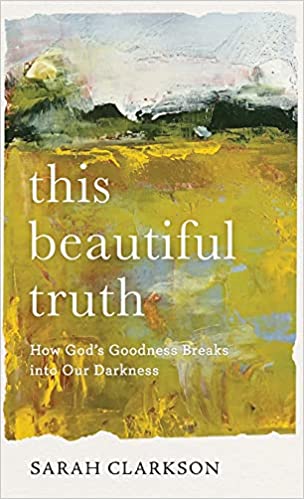Sarah Clarkson considers beauty as a means of grace, a gift from the God who loves and pursues broken souls. For her, she is thinking about it in terms of her own unusual form of the mental illness, Obsessive-Compulsive Disorder (OCD). Her vulnerability shines through along with her beautiful prose, and she draws the reader into her journey through brokenness. She works through doubt and moves into restored faith.
I love what she wrote about theodicy, a theological term for how to defend God's goodness in a world filled with evil and suffering.
"The first books of theodicy I read offered arguments that felt like lawyers' briefs. I felt that God was their client, in need of legal protection against the anguished accusations of those in pain" (p. 35).
"... I struggled through works on sovereignty and determinism, trying to understand theories in which God never loses control of any aspect of the world and yet cannot be blamed for its evil" (p. 35).
I, too, have felt that God allows one to suffer and have wondered if it was necessary for the plot of His (Jesus') story.
And she brings up Job, that Old Testament hero that had questions for God on his own suffering.
"Job is a drama of questions, a story that echoes with honest anguish. Yet answers are never given in the listed, scientific way we think they ought to be in the modern world" (p. 36).
"God breaks into Job's darkness by actually allowing himself to be summoned by Job's cries for justice. He allows Job to question and grieve, to yearn and weep. But what he offers is not an explanation but an encounter. For Job is summoned to behold God's goodness in the staggering pageant of creation, one so mighty in its loveliness that at its end, Job considers himself answered" (p. 37).
There are other quotes that I fell in love with. Here is one.
"The visions set forth in the books (and paintings and songs) we turn to for hope are offerings of love, given in the recognition that we truly are members of one another. We all bear the same hunger for eternity. We all walk forward in the dark of doubt, reaching for something we can’t quite name. We all walk blind and grieved in our suffering. We yearn to discover who we are meant to become, what it is we hunger to find in those midnight hours when our hearts will not be sated. But the artists and storytellers and makers of song offer the inner vision they have known as a sign of hope to the hungering world. They invite us into the sacred, inmost rooms of their minds and let us stand at the windows of their own imaginations where we glimpse, ah, wonders we might never have dreamed alone” (p. 187-188).
She also writes of homemaking. A friend offers clues to healing.
“She taught me the pleasure of taking the spaces we have (not the ones we wish we had) and making them beautiful, for room by room she made that little old house the work of her artistry. I watched her design a stained-glass window and save for it for weeks. And plan a room of built-in bookshelves and oversee their building for months…
‘I guess this is beauty enough for me,’ she said. And I think that was the orientation of her heart, to open herself so wholly to receive the goodness of God in whatever place she found herself that there was no such thing as limitation or lack. There was just her willing heart, sated by the beauty God gave. I know there must have been darkness—moments when her burdens must have weighed like lead upon her shoulders—yet those did not define her story” (p. 197-198).
Theology, story, music, photography, and people are all a means of grace. Her story, her craftsmanship, is exquisite.
Her strength lies in her knowledge of books, art, and music where she has found the beauty of God. The bottom line is that profound suffering can make God seem distant, even absent, to our souls, and that can shackle our ability to engage the Bible directly, soulfully, and personally. That said, all the beauties of art, music, creation, story, liturgy, and human love are but shadows of that truest beauty and most beautiful truth.
I would recommend this artful read to those interested in Christianity, to those touched by mental illness, to Christians suffering other kinds of "dark nights of the soul" that make the Bible feel like someone else's love letter, and to her followers who appreciate her. On Instagram she is @sarahwanders and you can appreciate the beauty in her life through her pictures.

 RSS Feed
RSS Feed